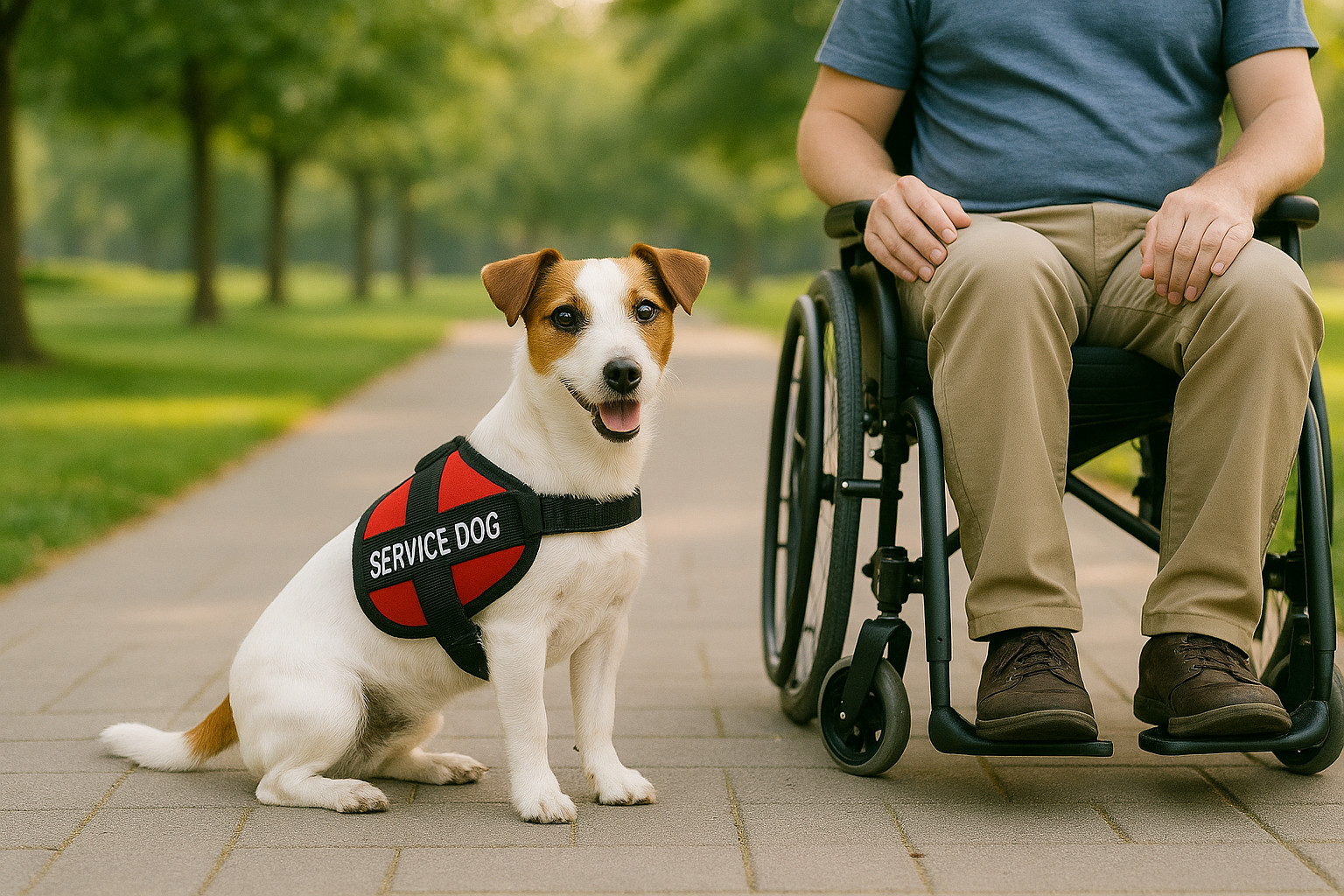Russell Terrier as a Service Dog

Russell Terrier Overview
The Russell Terrier, often confused or grouped with the Jack Russell Terrier, is a small, energetic breed known for its intelligence, determination, and agility. Originating from England, this terrier was originally bred for hunting foxes. Today, while still an excellent companion for active owners, its potential as a service dog is a topic worth exploring. Given the stringent requirements for service dogs, it's important to examine how the Russell Terrier fits into this role.
Physical Characteristics
Russell Terriers are small, compact, and athletic dogs. They typically weigh between 10 to 15 pounds and stand about 10 to 12 inches tall. Their size can be a double-edged sword in the realm of service work.
On the one hand, their compact size makes them convenient for handlers who need to bring a service dog into varied environments, such as public transportation systems, where larger breeds might struggle. However, their small stature limits their ability to perform tasks that require significant physical strength, such as pulling wheelchairs or providing physical support for mobility-impaired individuals.
Russell Terriers possess a short, smooth, or broken coat that is relatively low-maintenance, although regular brushing is advisable to control shedding. This feature is beneficial for handlers who might not have the capability or resources to manage frequent grooming sessions.
Temperament and Attitude
Russell Terriers are known for their lively and spirited nature. They are incredibly intelligent and often exhibit a high degree of curiosity, which can be both an asset and a challenge in a service dog context.
Their intelligence makes them capable of learning complex tasks relatively quickly, a significant positive when considering the rigorous training service dogs undergo. They are often highly motivated, especially by food and play, which trainers can exploit effectively during the training process.
However, their curiosity and independence sometimes manifest as stubbornness or distractibility, particularly in environments filled with stimuli. This trait can challenge the handler's ability to maintain the dog's focus and responsiveness. Moreover, their high energy levels, while excellent for active service roles, may be overwhelming in contexts that require calm and composed service animals.
In public or stressful environments, Russell Terriers demonstrate resilience, although their tendency to 'alert'—barking or reacting to sounds—can pose issues unless properly managed through training.
Types of Service Work
The Russell Terrier's attributes make it more suitable for specific types of service work. These roles typically capitalize on their agility, intelligence, and alert nature rather than physical strength.
- Psychiatric Service Dog: Russell Terriers can be trained to perform tasks for individuals with psychiatric conditions, such as interrupting harmful behaviors, providing deep pressure therapy, or reminding their handler to take medication. Their size makes them ideal lap dogs, capable of providing comfort.
- Hearing Assistance: Thanks to their acute hearing and natural alertness, Russell Terriers excel as hearing assistance dogs. They can be trained to alert their handler to specific sounds like doorbells, alarms, or ringing phones.
- Emotional Support Animal (ESA): While not formally categorized under the 'service dog' designation, Russell Terriers often serve as effective emotional support animals due to their affectionate nature and propensity for forming close bonds with their handler. Their playful and loving demeanor can provide significant emotional comfort.
Despite these suitable roles, the breed is generally not well-suited for roles requiring physical tasks that demand strength, such as mobility assistance or guide work, due to their size limitations.
Health Considerations
Like all breeds, the Russell Terrier has certain health conditions that might impact its ability to serve effectively as a service dog.
Common issues in the breed include:
- Patellar Luxation: Dislocation of the kneecap can affect the dog's mobility.
- Legg-Calvé-Perthes Disease: A hip joint disorder that can lead to arthritis, impacting their physical endurance and comfort.
- Deafness: Some Russell Terriers are predisposed to hearing loss, a critical drawback if they are trained as hearing assistance dogs.
- Eye Conditions: Issues like cataracts or lens luxation could impair their ability to perform specific tasks.
Regular veterinary check-ups and early screening can help manage these conditions, ensuring that the dog remains healthy enough to perform its service roles effectively.
Training and Suitability
Russell Terriers are highly trainable, largely due to their intelligence and eagerness to engage with the world around them. They thrive in training environments that use positive reinforcement techniques, such as rewards and praise.
The breed's trainability is both a boon and a responsibility. Their independent nature can sometimes lead to selective listening, so handlers or trainers must establish a strong alpha presence and maintain consistent training regimens. Russell Terriers benefit from early socialization and exposure to various environments to mitigate any tendencies towards hyperactivity or sensory overload.
In terms of suitability, the breed is best matched with handlers who possess an active lifestyle and are capable of providing the mental and physical exercise the dog craves. Service roles inappropriate for this breed involve intensive physical labor or environments that require absolute quiet and stillness, given their propensity for activity and alert barking.
Summary of Russell Terrier
- Strengths: Intelligent, agile, and ideal for confined spaces. Best suited for psychiatric service duties, hearing assistance, and as emotional support animals.
- Weaknesses: Small size limits physical support capabilities. Prone to distraction, requiring experienced handlers who can maintain training discipline.
- Types of Suitable Service Work: Psychiatric service dog, hearing assistance, emotional support.
- Health Considerations: Prone to patellar luxation and other joint issues, maintain regular vet check-ups.
- Training Requirements: Needs consistent training with a focus on socialization and mental exercise. Positive reinforcement is highly effective.
In conclusion, while the Russell Terrier may not fit the traditional mold of a service dog due to its size and the vigorous nature it often exhibits, it plays a vital role in specific service areas. Trainers and potential handlers should consider individual dogs for their unique temperament and energy levels, ensuring that the match between the handler's needs and the dog's capabilities is beneficial for both parties.











